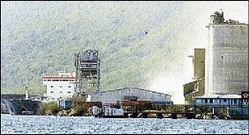Cement duty waiver stays - But volumes will be cut
Published: Wednesday | August 26, 2009

A section of Caribbean Cement Company's Rockfort plant is seen from the sea, May 2006. - File
In another victory for cement importers that also offers a mild concession to Caribbean Cement Company, Jamaica will retain the duty waiver for importers of the commodity but has reserved a larger portion of the market for the Rockfort-based monopoly producer.
Carib Cement was pressing to reclaim 100 per cent of the market, but Karl Samuda said Tuesday he would give them a secure 80 per cent, while importers would have the remaining 20 per cent, which becomes effective after September 9.
The decision has to be approved by Caricom before Jamaica can claim it a done deal.
The waiver, if approved, would extend the hold that Government first placed on the 15 per cent Common External Tariff on cement imports three years ago.
The importers' share, however, has been cut by five per cent from 25 per cent under the 2008 waiver, which allowed them then to supply up to 240,000 tonnes to the local market.
The 20 per cent will allow 170,000 tonnes to enter duty free.
Samuda did not say if the application has already been sent to Caricom's Georgetown headquarters or its Council for Trade and Economic Development.
"The ministry has made the decision to apply for suspension of the tariff on cement to the tune of 170,000 tons over the next year," he said.
Earlier this year, Carib Cement's parent company, Trinidad Cement, took the issue to the Caribbean Court of Justice, the arbiter for Caricom trade disputes, seeking to overturn Caricom's decision to approve last year's tariff waiver request.
The TCL bid was unsuccessful, but its local subsidiary has continued to mount strong opposition to the move, citing what it said are the harmful effects of the import liberalisation it has blamed for declining sales and loss of market share.
The government has said the 170,000 tonnes represent 20 per cent of the market effectively confining Caribbean Cement to 80 per cent of the market.
The cement maker last claimed 82 per cent of the market in the April to June quarter, down, it said, from 85 per cent in the first quarter ending March.
Months of lobbying
Samuda's decision to extend the waiver follows months of lobbying on one side from Carib Cement and on the other cement importer Tank-Weld and hardware merchants and building contractors.
The Jamaica Manufacturers' Association sided mostly with importers though the different sides have membership in the organisation, leading at one time to a threat by Carib Cement to pull from the JMA.
The cement maker launched an aggressive lobby to reclaim control of the market, saying it needed the revenue to pay for the US$177-million investment in boosted capacity to 1.8 million tonnes that is just now being wrapped up.
A resolute Samuda voiced the Government's view that Carib Cement's lack of adequate storage capacity for the product which is vital to the country's construction industry created a risk, he said, the state was unprepared to take.
"Taking all factors into consideration, we feel at this stage that there is not sufficient storage capacity to ensure that the construction industry is never short at a time when we are seeking to expand infrastructure," the minister said.
"We cannot be in a position like that which that left us with shortages like a year and a half ago. We have to think of inventory levels. The cement company only has a capacity to store two weeks' supply of the product. It takes three weeks to one month to get cement to Jamaica and so, in the event of a plant breakdown, it would put us at risk. I can't as a minister be faced with that possibility and not take appropriate steps."
With the total cement needs of the industry estimated to be 850,000 tonnes, Samuda urged the company to use the period of the contemplated extension to boost its storage capacity.
"We will apply the relief to 20 per cent of local needs for one year. This will give Carib Cement enough time to expand its storage capacity and adequately supply demand. It will also give them some form of competition at a time when cost containment in the construction industry is absolutely critical," said the minister, who also has responsibility for investment and commerce.
Bad move
But in an immediate response, the cement company has rubbished the Government's claim of the company's storage deficit, maintaining that the decision is a bad move.
"Our total storage capacity is 41,000 tonnes. Any emergency that we have would be a natural disaster and our storage is located strategically in several places across the island. We really do not believe that there is anything that could put us out of commission for an entire month, CCC spokesperson Alice Hyde told Wednesday Business.
"We have an unfairly traded product coming in which they are not paying duties on," she contended.
Asserting that the import-tariff relief would continue to affect her company negatively, the CCC marketing manager held to the company line that Carib Cement can meet national demand in full and without problems.
"We can definitely meet local demand," she reiterated, pointing to the Rockfort, Kingston, plant expansion and capacity upgrade to between 1.8 million and two million tonnes.
Meanwhile, the company's profits are down as construction GDP contracts and the cement market retreats.
Carib Cement blames the erosion of profits on the competition from imports.
Only last week, the company informed some 80 workers that their monthly salaries would not be paid by August 25 because of cash-flow problems that it attributed to "sustained contraction in the economy and its impact on sales".
avia.collinder@gleanerjm.com




















